In this article:
Nail-biting, also known as onychophagia, refers to a compulsive habit of biting or chewing the nails. The habit usually starts in childhood but can develop later as well. It is reported among people of all ages and affects 20%–30% of the global population. (1)
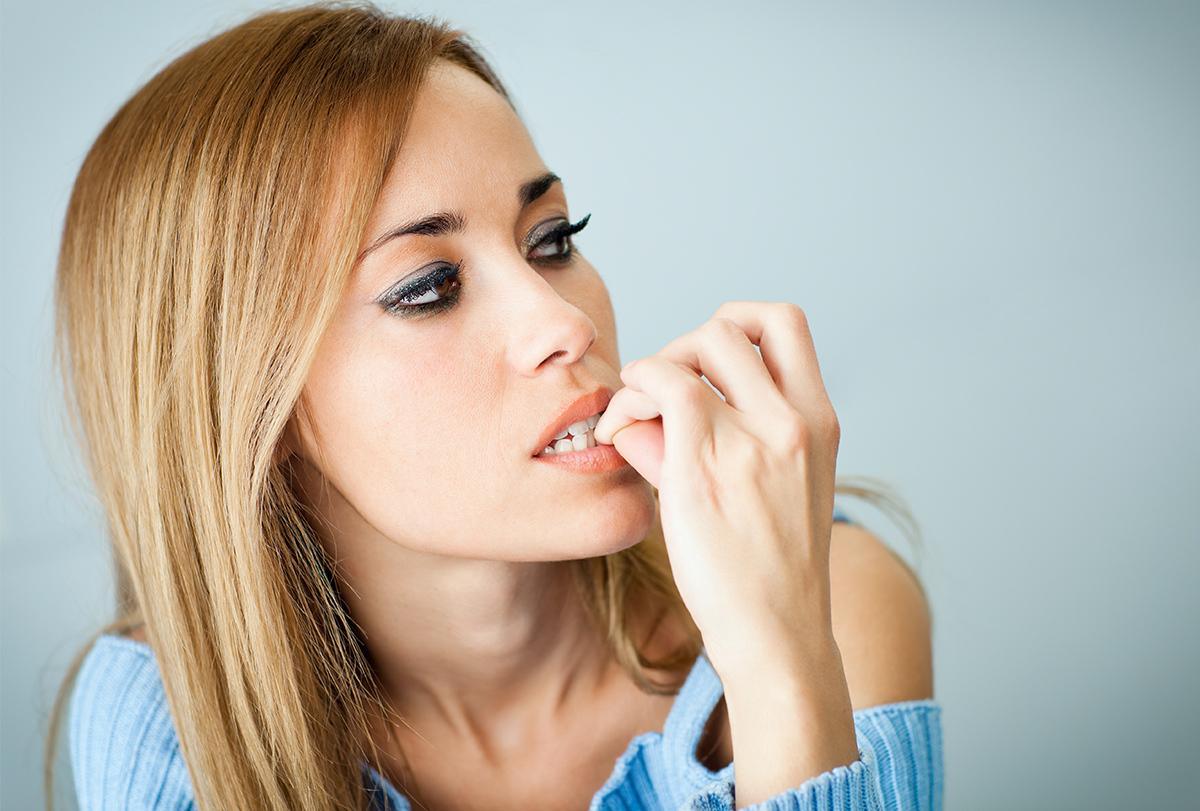
Most people take to nail-biting as a form of stress relief and tend to do it involuntarily. Although it is hard to break away from such ingrained tendencies, it is in no way impossible. As the age-old saying goes, where there is a will, there is a way.
Reasons Behind Nail-Biting
Nail-biting can be the result of various factors, including:
- Genetics: Research suggests that nail-biting is a trait that may be passed down from parents. (2) A family history of nail-biting can make you more prone to developing the habit yourself.
- Stress: Nail-biting seems to help some people deal with anxiety or stress. (2) Repetitive behaviors such as biting the nails can provide a temporary sense of relief when one is nervous.
- Boredom: Being bored or hungry may lead to compulsive urges such as nail-biting (3) or hair twirling. It stems out of a need to keep the hands busy.
- PICA: Pica is an eating disorder that involves eating inedible items such as stones, nails, and ice. It is primarily seen in children who start exploring the world through their mouths. It may occur without any underlying cause, but it is also linked to nutritional deficiencies, attention deficit hyperactivity disorder (ADHD), anxiety, and other mental health issues.
Common Ways to Stop Nail-Biting
Here are some useful tips to help you quit biting your nails:
1. Apply neem extract
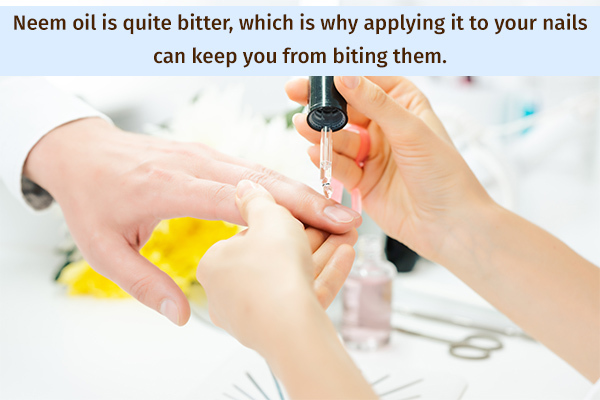
Neem oil is quite bitter, which is why applying it to your nails can keep you from biting them. Since neem is a natural antiseptic, it also helps prevent nail infections.
Pour 2–3 drops of neem oil on a cotton ball and dab it over and under your nails as well as across the cuticles.
2. Trim your nails
Trimming your nails helps keep them neat. Short nails are also harder to bite or chew.
3. Go for a regular manicure
Professional manicures are known to decrease nail-biting effectively.
When your nails are adorned with nail paints and beautiful embellishments, they become much harder to deface. You will be forced to think twice before biting them with your teeth.
Plus, the cost of a manicure itself may stop you from chewing your nails.
4. Get artificial nails
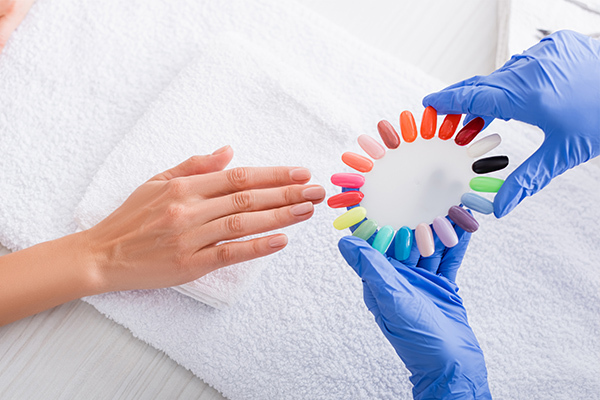
Artificial nails, which include acrylic, gel, and press-on ones, make it harder to dig your teeth into and therefore are effective deterrents to compulsive nail-biting.
When buying artificial nails, make sure to choose the correct size, or else they will keep falling off.
5. Wear gloves
Gloves prevent you from biting your nails. Gloves are quite convenient for winters as they also keep your hands warm, but can be a nuisance during hot and humid months.
6. Apply self-adhesive bandages to your fingertips
Cover your fingertips with multiple bandages to discourage nail-biting. (4) Make sure to change your bandages every time they get wet or dirty to maintain proper hygiene and avoid infections.
7. Seek cognitive-behavioral therapy (CBT)
CBT helps you identify your problematic behavior patterns and where they are stemming from so that you can work toward overcoming them.
People unconsciously develop maladaptive behaviors such as nail-biting as a means to cope with some deep-settled, difficult feelings that they are trying to evade.
During your CBT sessions, your counselor will try to get to the root of the problem through a free-flowing discussion and then suggest ways to reconcile with those difficult feelings so that you can control your compulsive tendencies. (4)
8. Adopt a new habit
If you find yourself biting your nails frequently out of boredom, it may be a sign that you need to find a hobby to pass the time. Learn a new activity that can help take your mind off stress and keep your hands occupied.
Cooking, drawing, knitting, and painting are all fun ways to spend your free time productively.
9. Manage your stress levels
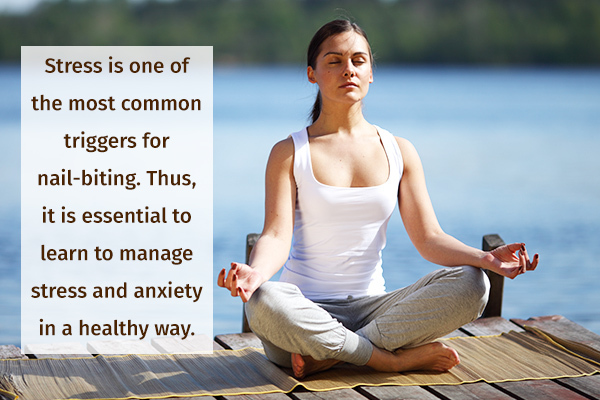
Stress is one of the most common triggers for nail-biting. (5) Thus, it is essential to learn to manage stress and anxiety in a healthy way.
Practice relaxation techniques such as yoga, deep breathing, and meditation to calm your mind. Plus, engage in activities that give you pleasure and try other therapeutic interventions such as taking a steam bath or sauna to relieve stress.
Self-Care Measures for Nail-Biters
The following measures can help you overcome the habit of nail-biting and repair the nail damage caused by it:
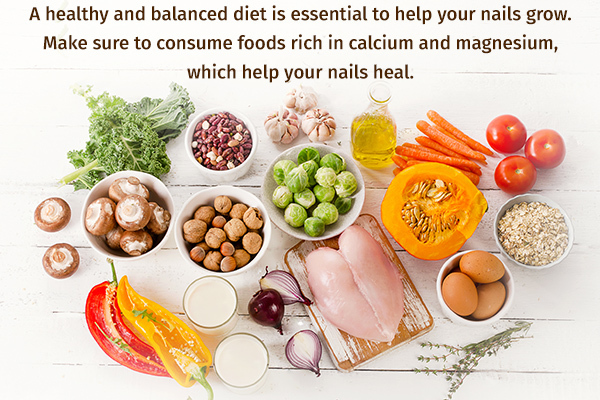
- A healthy and balanced diet is essential to help your nails grow. Make sure to consume foods rich in calcium and magnesium, which help your nails heal.
- You can train your mind to associate nail-biting with negative outcomes to deter you from the habit. One way to achieve this is by snapping a rubber band on the inside of your wrist every time you catch yourself biting your nails.
- If you notice yourself biting your nails out of boredom, keep a bottle of water with you at all times. Every time you feel the urge to bite your nails, drink some water instead. This gives you an activity to focus on and also keeps your hand busy.
Complications of Nail-Biting
Compulsive nail-biting can give rise to several problems:
- Frequent nail-biting can damage your nails and the surrounding tissue. (6) It may also lead to sore and swollen skin.
- Swallowing small bits of nails accidentally may cause stomach infections.
- Biting your nails can also transfer bacteria from the nails to your mouth, causing oral and facial infections.
- Regular nail-biting may lead to gaps between teeth and erosion of enamel. This can pave the way for more serious dental issues in the long run.
When to See a Doctor
Red, sore, or swollen skin around your nails due to excessive nail-biting can be a sign of infection. Seek medical examination and treatment right away.
Final Word
Although nail-biting is not particularly harmful to your health, excessive doing it may lead to nail bed infections or deformed nails.
Following the simple steps given above can be enough to help you quit this habit. However, if the problem persists, it is highly suggested to consult a doctor.
- Was this article helpful?
- YES, THANKS!NOT REALLY


